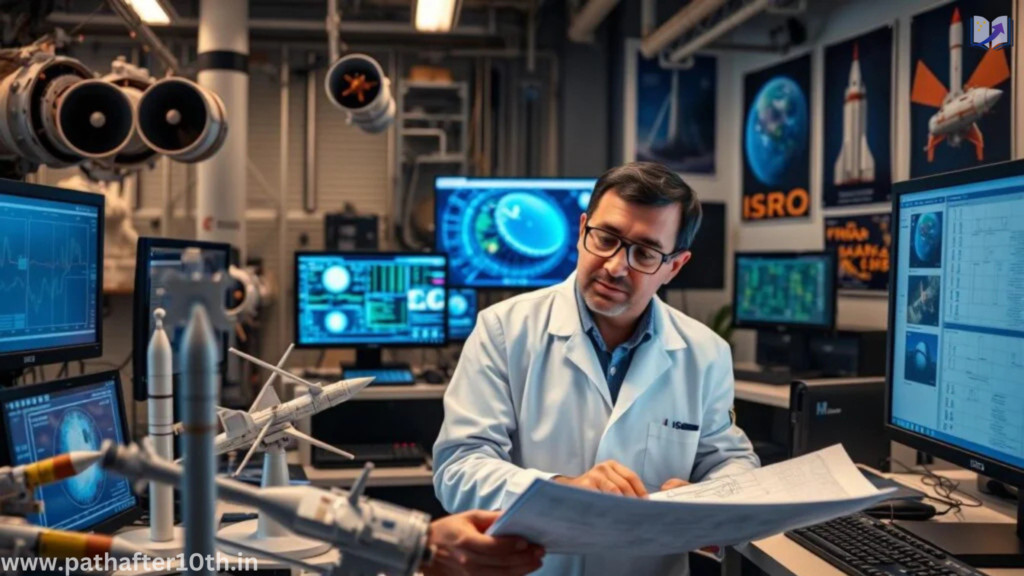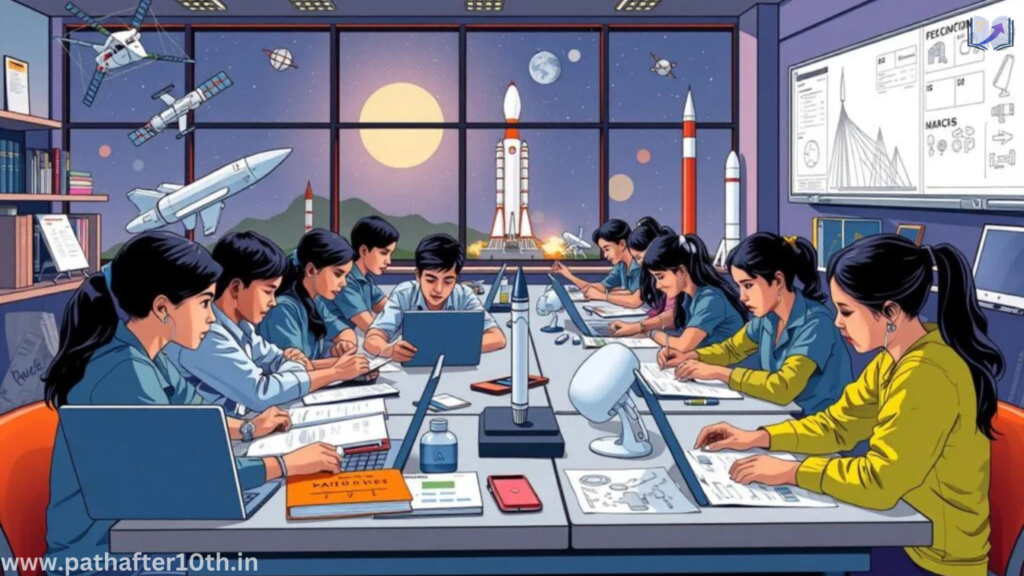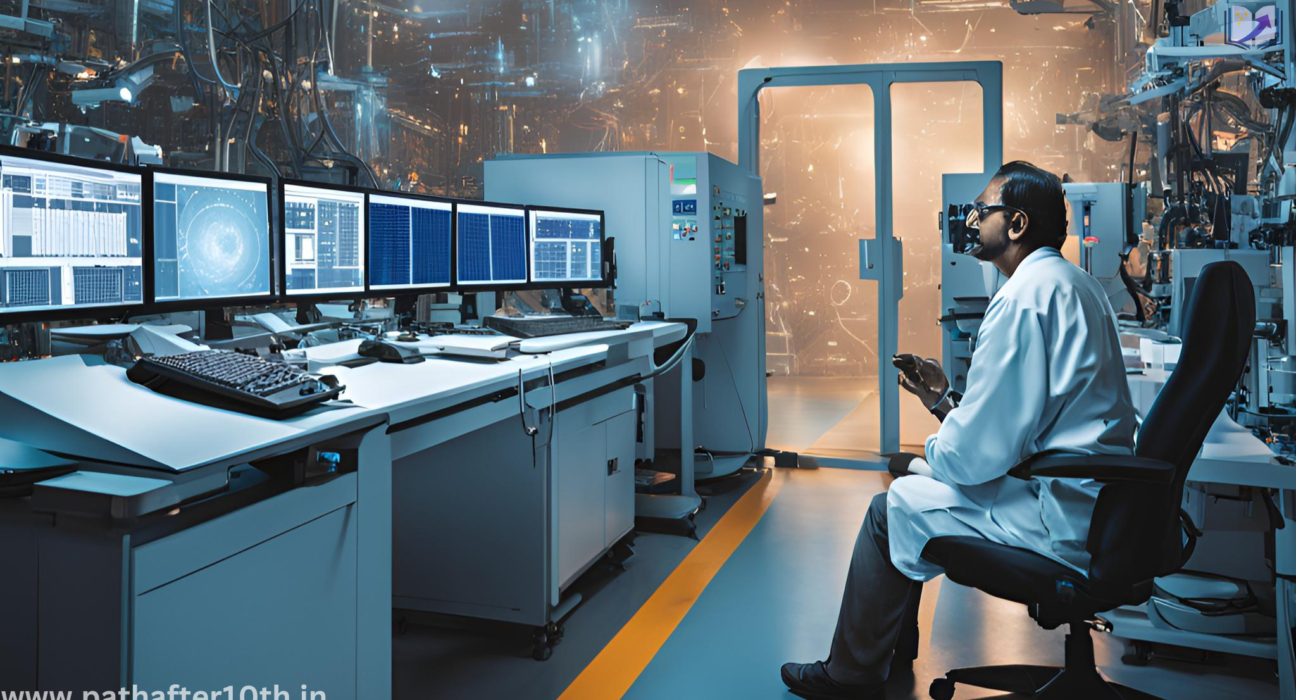Are you dreaming of a career with India’s top space research group, the Indian Space Research Organisation (ISRO)? This famous organization is a great choice for those eager to explore new scientific and technological frontiers.
ISRO’s scientist engineers are key to India’s space progress. They help with important research, create advanced spacecraft and satellites, and push the country’s space goals. Their work, from new propulsion systems to complex communication satellites, is truly amazing.
Want Know About Essential Algebra Formulas for Students
Visit our Blog: https://pathafter10th.in/algebra-formulas-for-students/

Choosing a career with ISRO means working with some of the smartest people in the field. You’ll be part of projects that grab global attention and help grow India’s space abilities. No matter if you’re into satellite tech, rocket engineering, or exploring other planets, ISRO has many exciting paths for you.
Key Takeaways
- ISRO offers a rewarding career path for aspiring scientists and engineers
- ISRO scientist engineers play a crucial role in advancing India’s space program
- Diverse career opportunities in areas such as satellite technology, rocket engineering, and planetary exploration
- Chance to work with leading experts and contribute to groundbreaking research
- Potential for professional development and growth within ISRO
Understanding the Role of ISRO Scientist Engineer
As an ISRO scientist engineer, you are key to India’s space and satellite tech. Your job covers many areas, each needing special skills. Let’s explore what your role in the Indian Space Research Organization (ISRO) entails.
Key Responsibilities and Work Areas
As an ISRO scientist engineer, your main tasks include:
- Designing and developing advanced satellite systems, payloads, and related components
- Conducting research and experiments to enhance the performance and reliability of space technologies
- Analyzing data from satellite missions and ground-based observations to support scientific discoveries
- Collaborating with cross-functional teams to tackle complex engineering challenges
- Participating in the planning and execution of space missions, ensuring seamless operations
Different Specializations Within ISRO
ISRO has many specializations to match its wide range of work. As an ISRO scientist engineer, you can specialize in areas like:
- Aerospace Engineering: Focusing on the design, development, and testing of spacecraft, rockets, and related systems
- Satellite Communications: Responsible for the design, integration, and operation of satellite communication networks
- Remote Sensing: Utilizing satellite data and imaging technologies to support applications like environmental monitoring, agriculture, and urban planning
- Propulsion Systems: Developing advanced rocket engines, thrusters, and other propulsion technologies for space missions
Research and Development Focus
Research and development (R&D) are at the core of ISRO’s success. As an ISRO scientist engineer, you’ll lead in cutting-edge research. Your work may include:
- Exploring innovative solutions to enhance the performance and efficiency of space systems
- Collaborating with leading research institutions and universities to advance the frontiers of space science
- Staying abreast of the latest trends and advancements in the global space industry
- Transforming research outcomes into practical applications that benefit the nation and humanity
Your role as an ISRO scientist engineer is diverse and exciting. It offers you the chance to push scientific and technological limits. By using your specialized knowledge and skills, you can help India’s space program and make a significant global impact.

Educational Requirements and Qualifications
To become an ISRO scientist engineer, you need a solid educational foundation. A bachelor’s degree in engineering, physics, or applied sciences is essential. Many also have master’s or doctoral degrees, which can help them stand out.
ISRO looks for specific skills and qualifications. They want candidates with knowledge in aerospace engineering, satellite technology, and more. Practical experience, research papers, or special certifications can also boost your application.
| Educational Requirement | Relevant Fields of Study |
|---|---|
| Bachelor’s Degree | Engineering (Aerospace, Mechanical, Electronics, Computer Science)PhysicsApplied Sciences |
| Advanced Degrees (Optional) | Master’s in Engineering or Applied SciencesDoctoral (Ph.D.) in Relevant Disciplines |
| Specialized Certifications | Aerospace EngineeringSatellite TechnologyPropulsion SystemsSpace Mission Design |
The ISRO selection process is tough, and the right education is key. By matching your education and experience with ISRO’s needs, you can improve your chances. This could lead to a prestigious role in this renowned space agency.

Application Process and Selection Criteria
If you dream of becoming an ISRO scientist, knowing the application process and selection criteria is key. The journey starts with understanding the requirements and standards of the Indian Space Research Organisation (ISRO).
Written Examination Pattern
The first step is a written exam. It tests your technical knowledge, problem-solving skills, and analytical thinking. The exam includes:
- Multiple-choice questions on math, physics, and engineering.
- Subjective questions to check your understanding and problem-solving.
- An aptitude test for logical reasoning, quantitative skills, and language.
Interview Process Details
Those who pass the written exam move to a tough interview. The ISRO selection panel will check your technical skills, research ability, and fit for the role. You might be asked to:
- Talk about your past projects, research, or academic achievements.
- Show your problem-solving skills through case studies or hypothetical scenarios.
- Explain your knowledge of ISRO’s projects and how you can contribute.
- Share your passion for space science and engineering.
Medical Requirements
ISRO also has strict medical standards for its scientist engineers. Candidates must pass a detailed medical check-up. This includes:
- A thorough physical check to ensure your health and fitness.
- Vision and hearing tests to meet the required standards.
- Psychological evaluations to assess your mental fitness and emotional stability.
- Drug tests and other specialized exams as per ISRO’s rules.
Understanding the application process and selection criteria helps aspiring ISRO scientist engineers prepare. It increases their chances of joining this prestigious organization.
Salary Structure and Benefits Package
Working as an ISRO scientist engineer comes with a good salary and a wide range of benefits. The pay is competitive, aiming to keep the best talent in space research and development. This is crucial for ISRO’s success.
The starting salary for ISRO scientist engineers varies based on their education, experience, and role. Newcomers usually earn between ₹60,000 to ₹80,000 a month. More experienced and senior roles can reach up to ₹1,20,000 a month or more.
ISRO scientist engineers also get extra allowances and benefits. These include:
- Dearness Allowance (DA): Helps with the cost of living due to inflation.
- House Rent Allowance (HRA): Helps with housing costs, especially in big cities.
- Transport Allowance: Helps with travel costs, like fuel or public transport.
- Leave Travel Concession (LTC): Covers travel costs during holidays.
- Retirement Benefits: Offers pensions, provident fund, and gratuity when you retire.
- Medical Benefits: Access to ISRO’s health services and insurance for you and your family.
- Performance-based Incentives: Bonuses and promotions for good work.
The salary and benefits package is designed to support ISRO scientist engineers financially and personally. It helps them grow professionally and personally, focusing on India’s space and tech advancements.

ISRO Scientist Engineer Career Growth Path
Being an ISRO scientist engineer opens up great chances for growth. The organization appreciates your skills and hard work. It offers ways to move up in your career and take on leadership roles.
Promotion Timeline
ISRO has a clear plan for promotions. You can move up every 3-5 years. If you perform well, you might get promoted faster.
By showing your technical skills and dedication, you can take on bigger tasks. This helps you grow in your career.
Professional Development Opportunities
- Get better at your job with advanced training and workshops.
- Join research projects and conferences to learn about new space tech.
- Work with top experts to share and get new ideas.
- Get advice from senior staff who have been in your shoes.
Leadership Roles
As you grow, you might get to lead projects or teams. You could even become a director in a research unit.
Show your skills, strategic thinking, and ability to lead. This way, you can reach leadership positions. It’s a chance to help ISRO succeed and grow your career.
Current Projects and Research Areas
As an ISRO scientist engineer, you’ll play a key role in India’s space program. You’ll work on exciting projects and research areas. From satellite tech to space exploration, the work is truly amazing.
The Chandrayaan lunar program is a major project. It aims to learn more about the Moon. ISRO scientists design new tools and conduct studies that expand our knowledge.
The Mars Orbiter Mission, Mangalyaan, is another highlight. It has made a big impact worldwide. It has also collected important data.
ISRO also works in remote sensing, communication satellites, and more. These areas help with education, healthcare, and disaster management. As an ISRO scientist engineer, you’ll help make a difference in people’s lives.
Want Know More Click Here
FAQ
What are the key responsibilities and work areas of an ISRO scientist engineer?
As an ISRO scientist engineer, you’ll do research and develop new technologies. You’ll also test and design new systems. Your work will help advance India’s space program.
You’ll work in areas like satellite engineering and rocket propulsion. Other fields include aerospace systems and materials science.
What are the different specializations within ISRO?
ISRO has many specializations. These include satellite communication and remote sensing. You can also work in space physics, space biology, and mission operations.
You can choose an area that fits your interests and skills. This allows for personal growth and development in your career.
What are the educational requirements and qualifications to become an ISRO scientist engineer?
To be an ISRO scientist engineer, you need a Bachelor’s or Master’s degree. It should be in engineering, like aerospace or electrical engineering. Some jobs might need a Ph.D. or extra certifications.
What is the application process and selection criteria for ISRO scientist engineer positions?
The application process includes a written test, interview, and medical exam. The test checks your technical skills and problem-solving. The interview looks at your expertise and fit for the role.
What is the salary structure and benefits package for ISRO scientist engineers?
ISRO offers a good salary and benefits. Your pay depends on your qualifications and experience. You’ll get a base salary, allowances, bonuses, and more.
Benefits include healthcare, housing, and retirement plans. It’s a comprehensive package.
What are the career growth opportunities for ISRO scientist engineers?
ISRO offers great career growth. You can move up and take on leadership roles. There are training programs and international opportunities for professional development.
What are some of the current projects and research areas at ISRO?
ISRO works on many projects. These include advanced satellite systems and interplanetary missions. They also focus on rocket propulsion and space applications for sectors like communication and navigation.







